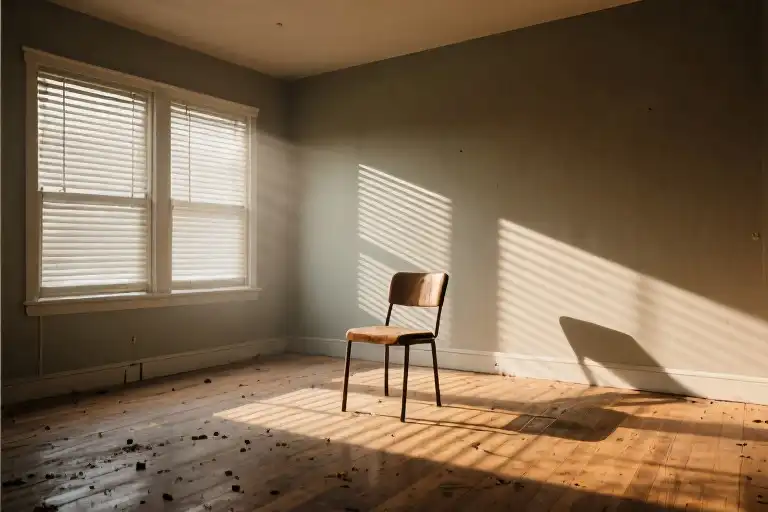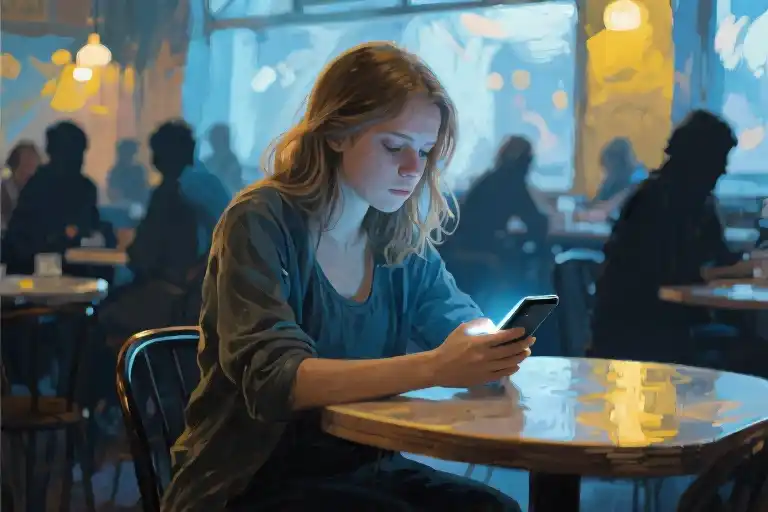The Sunday light fell in slanted rectangles across the wooden floor, accentuating the emptiness that had settled into the house like a permanent guest. Six weeks of silence stretched between the vertical walls, their blank surfaces indifferent to the horizontal loneliness pooling across the floorboards. Through the smudged windowpanes, a row of overstuffed trash cans stood sentinel – their contents now a mystery even to him, the person who had filled them.
A thin layer of dust danced in the sunlight where furniture should have been. The air smelled faintly of lemon cleaning products and something deeper, something like forgotten promises. His savings had evaporated into this space – money meant for his aging parents’ care, for a fresh start somewhere brighter. Now it lingered only as absence, hiding in the cracks of poorly hung cabinets and the hollow spaces behind baseboards.
Outside, the distant whine of drag racing engines cut through the afternoon. The sound came and went like waves, punctuated by bursts of adolescent laughter. He sat on the one furnished island in this sea of emptiness – a discount couch from Costco that had seemed temporary three months ago. The blinds were drawn against tomorrow, casting striped shadows that made the room feel like a prison or perhaps a sanctuary, depending on the hour.
In the kitchen, a single plate sat in the drying rack. The fork beside it still carried the ghost of breakfast, though he couldn’t remember eating. This was how time moved now – in unmarked increments between moments he could recall and those that slipped away like water through fingers. The trash cans outside overflowed with evidence of living, yet standing here, he couldn’t name a single thing he’d thrown away.
Somewhere between the vertical insistence of the walls and the horizontal surrender of the floor, between what was meant to be and what remained, his life had condensed to this single point of existence. Not the full circle he’d imagined, not even an arc – just a dot, pulsing faintly in the empty space of what might have been.
Horizontal Loneliness
The house stood silent, its emptiness amplified by the Sunday stillness. Sunlight filtered through half-drawn blinds, painting stripes of pale gold across wooden floors that stretched endlessly – horizontal planes of loneliness that vertical walls could never comprehend. In the corner, a patch of wallpaper curled upward like a forgotten question, its edges browned by time and neglect.
He walked past the kitchen window where a row of trash cans stood sentinel. They were full – he knew this with certainty – yet couldn’t remember what they contained. The contents had become irrelevant the moment they crossed the threshold from usefulness to waste. Much like his savings, he thought bitterly, swallowed whole by this house that promised transformation but delivered only hollow spaces.
Every room held artifacts of incompletion. The eastern wall where sunlight never quite reached, no matter how he adjusted the blinds. The bedroom closet with its single wire hanger clicking against the rod when trucks rumbled by. The living room’s acoustics that amplified every footstep into an echo of solitude.
Outside, the trash cans overflowed with:
- Takeout containers from meals eaten standing at the counter
- Broken picture frames (he’d stopped displaying photos months ago)
- Wrinkled receipts for furniture never assembled
- Half-empty notebooks with abandoned self-improvement plans
The garbage had become more substantial than the life it represented. At least the trash knew its purpose – to be contained, collected, eventually discarded. He envied that certainty.
Urban loneliness manifests in these quiet rebellions of space against occupant. The way floors creak differently when no one else is there to hear them. How refrigerator hums grow louder in empty kitchens. The peculiar mathematics of isolation that makes square footage expand inversely to emotional capacity.
In the bathroom mirror, his reflection had developed a habit of avoiding eye contact. The house’s vertical surfaces – walls, doorframes, windows – all seemed to lean slightly away from him, as if maintaining polite distance from someone radiating quiet desperation. Even the shadows behaved differently here, pooling in corners like liquid patience waiting for him to leave.
Sometimes at night, he’d press his palm against the cool drywall, imagining he could feel the house breathing. They shared this rhythm now – two empty vessels measuring time in silent increments. The trash cans would be emptied on Wednesday. The sunlight would continue its daily sweep across the floor. The loneliness would remain horizontal – wide, flat, and impossible to climb out of.
The Vanishing Point of Savings
The numbers had seemed so solid when they were still digits on a screen. $23,500 – enough for his parents’ assisted living deposit or that tiny studio apartment near the arts district. He could still trace the phantom shapes those numbers used to form in his mind: his mother’s wheelchair gliding across polished floors, his own paintings leaning against sunlit brick walls. Now both visions dissolved like steam from the bathroom mirror after another sleepless shower.
Somewhere between the third grocery delivery and the inexplicable plumbing repairs, the savings account bled out. The money didn’t disappear dramatically – no medical emergency, no gambling spree. It seeped away through microscopic cracks in his planning, like sand through clenched fingers. He found himself cataloging the losses with forensic absurdity: $127 for the ergonomic desk chair that never eased his back pain, $89 for the self-help books still shrink-wrapped by the toilet, $6.50 per day for the oat milk lattes that briefly tricked him into feeling productive.
The Costco couch became the sarcophagus of his financial afterlife. Its taupe microfiber held the indentation of his body like a chalk outline, the receipts from its purchase lost among takeout menus in the junk drawer. Sometimes he’d press his palm against the armrest and imagine feeling the residual warmth of his former self – the version who believed a $399 sofa could be temporary. Now its springs sang the same creaky lullaby every night, harmonizing with the rattle of loose change in his pockets.
Downtown life had promised concentric circles of fulfillment – career, community, purpose. Instead he inhabited a single pixel of that blueprint, the period at the end of an abandoned sentence. His kitchen cabinets yawned empty except for half-used condiments, their expiration dates ticking toward irrelevance. The peeling laminate surfaces reflected his face in fragments, a cubist self-portrait of urban isolation.
At 3:17 AM, when the drag racers’ engines faded into tinnitus, he’d perform the ritual. Fingers probing the narrow gap between refrigerator and wall, as if the missing thousands might materialize like a lost earring back. The space only yielded dust bunnies and a single desiccated blueberry. This was the archaeology of evaporated dreams – sedimentary layers of delivery apps, utility bills, and the unopened gym membership welcome kit.
The cruelest mathematics wasn’t the subtraction from his bank account, but the division of his expectations. That perfect zero he’d imagined – the balanced equation of effort and reward – had decimaled into infinite insignificance. Some nights, staring at the water stain on the ceiling (shaped like Australia, if Australia were drowning), he wondered if the money had ever been real at all. Perhaps it was always just the theoretical currency of hope, converted at terrible exchange rates.
From the couch’s embrace, he watched sunlight crawl across the warped hardwood. The rays illuminated motes of dust performing their endless ballet – weightless, directionless, beautiful in their irrelevance. His phone buzzed with a calendar reminder: ‘Transfer to Parents’ Fund.’ The alert pulsed like a phantom limb.
The Charred Narrative
The sadness had texture now – dry, brittle, like the blackened crust of a sirloin left too long on the grill. It wasn’t the dramatic ruin of flames, but the quiet tragedy of gradual neglect. You could still recognize the shape of what should have been nourishing, if only someone had been paying attention when it mattered.
This was how he found himself studying the photograph that wasn’t taken. The one existing only in his mind’s eye: a perfect rectangular composition where the television glowed with curated playlists, the bookshelf stood obediently arranged by color, and the single armchair faced the window at just the right angle to suggest thoughtful solitude rather than desperate isolation. Instagram would approve.
But beyond those carefully staged edges? The truth in cardboard. Unopened moving boxes from two years ago slumped against each other, their Sharpie labels (KITCHEN, BATH, MISC) fading into irrelevance. A pyramid of rubber bins contained the archaeological layers of abandoned hobbies – guitar strings coiled like dead snakes, a DSLR camera with its lens cap permanently on, sketchbooks with three used pages. The performative objects inside the frame whispered lies; the clutter outside shouted them down.
He ran a finger along the edge of an imaginary viewfinder, testing its boundaries. The camera always lied through omission. Crop out the laundry pile, and you had a minimalist. Exclude the takeout containers, and you were a home chef. Omit the loneliness, and voilà – an enviable independent life. Social media had turned existence into a game of strategic editing, where people proudly displayed their highlight reels while treating the raw footage like contraband.
And then the existential twist: someone else was always framing you in their narrative. Your messy truth became background blur in their perfect shot. The realization settled like charcoal in his throat – we’re all simultaneously the staged subject and the unseen photographer, both complicit in the collective fiction of togetherness.
Outside, the drag racing kids’ laughter skidded around the corner. Inside, the unphotographed boxes stood sentinel. Between them hung the question: If sadness could take physical form, would we finally stop pretending it doesn’t exist in polite company?
The Lens of Others
The shutter clicks. A fraction of a second frozen in pixels, where he exists not as himself but as a composition of someone else’s narrative. Outside the apartment window, the revving engines of drag racing teens fade into the urban hum – a soundwave graph of disconnection that mirrors his own muffled presence in the world.
He imagines the photograph being taken from across the street. The viewer would see what all staged interiors reveal: the intentional shelf of leather-bound classics bought by the yard at an estate sale, the artfully distressed coffee table holding a single sculptural object. A curated still life whispering cultivated tastes and quiet Sunday pleasures. No one would suspect the boxes behind the sofa still bear October’s moving labels, that the rubber bins in the closet vomit tangled cables of abandoned hobbies.
This is how urban loneliness operates – not through dramatic emptiness, but through the exhausting performance of fullness. The existential crisis lives in the gap between the Instagram grid and the unphotographable moments when you stare at a refrigerator humming in an empty kitchen. Modern isolation wears the face of participation while its bones ache with disconnection.
Three floors below, a car door slams. Laughter spirals upward like confetti from some vibrant life he’s not invited to. He wonders if he appears in the background of their photos – a blurry figure in a window, destined to be cropped out. This is the identity struggle of our age: to simultaneously feel like the protagonist of your own story and an extra in everyone else’s.
The racing engines return, closer now. For a moment he considers throwing open the window, leaning out into the golden hour light where he might be visible. But the moment passes, and with it the sound of tires on asphalt. Somewhere in the building, a real camera shutter clicks. He’ll never know if he made it into that frame.
What version of ourselves survives in other people’s albums? The carefully posed laugh, or the unguarded sigh before the smile? The meaning of life might simply be the sum of all angles from which we’ve been observed, a cubist portrait no single viewer comprehends. Emotional burnout comes when we realize we’re spending more energy maintaining these fragments than discovering what exists between them.
Through the wall, a neighbor’s television murmurs the laugh track of a sitcom. It occurs to him that being someone else’s background character might be the most honest connection we ever make – unposed, unedited, existing simply because we were there. The literary essays about modern isolation never mention this: that sometimes being unseen is the only way to remain real.
A siren wails in the distance, the city’s endless soundtrack. He closes his eyes and imagines the photograph one more time. Not the cropped and filtered version, but the full frame with its messy edges – the life that spills outside the borders, demanding to be witnessed.
The Frame and the Photographer
The laughter of children fades into the urban hum as a distant shutter clicks – that mechanical sound of someone else’s memory being made. You realize with startling clarity how often we exist as subjects in other people’s narratives, carefully cropped versions of ourselves smiling obediently at birthday parties or standing attentively at weddings. The full composition always lies just beyond the frame’s edge.
Modern isolation manifests in these curated moments. We become characters in other people’s stories – the reliable coworker in office lore, the dutiful child in family albums, the mysterious neighbor in building gossip. Our urban loneliness grows from this fragmentation, this existential crisis of being simultaneously observed yet fundamentally unseen.
Consider your own life’s album:
- Which version of you appears most frequently in others’ photographs?
- What truths always get left outside the composition?
- When did you last see an unfiltered reflection of your authentic self?
The street racers’ engines whine like anxious thoughts as twilight stains the apartment walls. There’s profound freedom in recognizing we’re all amateur photographers of each other’s lives – clumsy, subjective, and hopelessly limited by our own angles and exposures. Perhaps meaning begins when we stop posing for invisible cameras and start developing our own negatives.
Somewhere below, a child drops an ice cream cone. The tragedy is instantaneous, the wail piercing. No one photographs this moment. It won’t appear in any family album. Yet this raw, uncurated emotion – this too is life, perhaps more so than all our carefully arranged performances combined.
The shutter clicks again. Always clicking. But remember: you are both the framed and the framer, the subject and the gaze. In this dual awareness lies the first step through urban loneliness toward something resembling connection.





